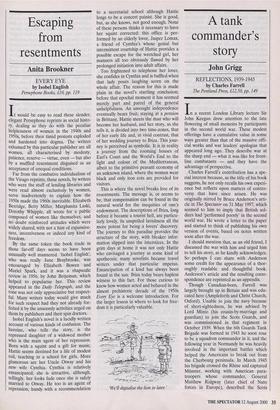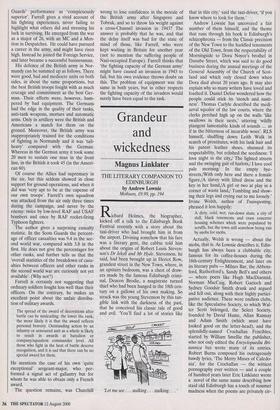A tank commander's story
John Grigg
REFLECTIONS, 1939-1945 by Charles Farrell The Pentland Press, £12.50, pp. 149 In a recent London Library lecture Sir John Keegan drew attention to the late flowering of small memoirs by participants in the second world war. These modest offerings have a cumulative value in some ways greater than that of the massive offi- cial works and war leaders' apologias that appeared long ago. They describe war at the sharp end — what it was like for front- line combatants — and they have the advantage of perspective.
Charles Farrell's contribution has a spe- cial interest because, as the title of his book suggests, he not only recalls his own experi- ence but reflects upon matters of contro- versy that have since arisen. He was originally stirred by Bruce Anderson's arti- cle in The Spectator on 31 May 1997, which seemed to him to imply that British sol- diers had 'performed poorly' in the second world war. He wrote a letter to the paper and started to think of publishing his own version of events, based on notes written soon after the war.
I should mention that, as an old friend, I discussed the war with him and urged him to tell his story, as he kindly acknowledges. So perhaps I can share with Anderson some credit for the appearance of a thor- oughly readable and thoughtful book. Anderson's article and the resulting corre- spondence are reprinted as an appendix.
Though Canadian-born, Farrell was largely brought up in Britain and was edu- cated here (Ampleforth and Christ Church, Oxford). Unable to join the navy because of short-sightedness, he was advised by Lord Minto (his cousin-by-marriage and guardian) to join the Scots Guards, and was commissioned in that regiment in October 1939. When the 6th Guards Tank Brigade was formed in 1943 he soon rose to be a squadron commander in it, and the following year in Normandy he was heavily involved in the important battles which helped the Americans to break out from the Cherbourg peninsula. In March 1945 his brigade crossed the Rhine and captured Miinster, working with American para- troopers whose commander, General Matthew Ridgway (later chief of Nato forces in Europe), described the Scots Guards' performance as 'conspicuously superior'. Farrell gives a vivid account of his fighting experiences, never failing to highlight what others did and stressing his luck in surviving. He emerged from the war as a major of 26, with an MC and a Men- tion in Despatches. He could have pursued a career in the army, and might have risen high. Instead he joined the Foreign Service, and later became a successful businessman.
His defence of the British army in Nor- mandy can be summed up as follows. There were good, bad and mediocre units on both sides, in about the same proportions, but the best British troops fought with as much courage and commitment as the best Ger- man. Their efforts were, however, ham- pered by bad equipment. The Germans had the edge in the quality of their tanks, anti-tank weapons, mortars and automatic arms. Only in artillery were the British and Americans a match for them on the ground. Moreover, the British army was inappropriately trained for the conditions of fighting in Normandy and it was 'tail- heavy' compared with the German. Whereas in the German army it took some 20 men to sustain one man in the front line, in the British it took 45 (in the Ameri- can 60).
Of course the Allies had supremacy in the air, but this seldom showed in close support for ground operations, and when it did was 'very apt to be at the expense of our own troops'. Farrell's own squadron was attacked from the air only three times during the campaign, and never by the enemy: twice by low-level RAF and USAF bombers and once by RAF rocket-firing Typhoon fighters.
The author gives a surprising casualty statistic. In the Scots Guards the percent- age of officer casualties was 9.4 in the sec- ond world war, compared with 3.8 in the first. He does not give the percentages for other ranks, and further tells us that the 'overall statistics of the breakdown of casu- alties between officers and other ranks in the second world war are curiously not yet available'. (Why not?) Farrell is certainly not suggesting that ordinary soldiers fought less well than their officers. On the contrary, he makes an excellent point about the unfair distribu- tion of military awards.
The spread of the award of decorations after battle can be misleading: the lower the rank, the more likely it is that the award reflects personal bravely. Outstanding action by an infantry or armoured unit as a whole is likely to result in awards at battalion or company/squadron commander level. All those who fight in the heat of battle deserve recognition, and it is sad that there can be no special award for them.
He mentions the case of his own 'quite exceptional' sergeant-major, who per- formed a signal act of gallantry but for whom he was able to obtain only a French award.
The question remains, was Churchill wrong to lose confidence in the morale of the British army after Singapore and Tobruk, and so to throw his weight against a cross-Channel invasion in 1943? The answer is probably that he was, and that the delay itself was bad for the state of mind of those, like Farrell, who were kept waiting in Britain for another year (not to mention the suffering people of Nazi-occupied Europe). Farrell thinks that 'the fighting capacity of the German army' might have caused an invasion in 1943 to fail, but his own evidence throws doubt on this. The problem of equipment was the same in both years, but in other respects the fighting capacity of the invaders would surely have been equal to the task.



























































 Previous page
Previous page